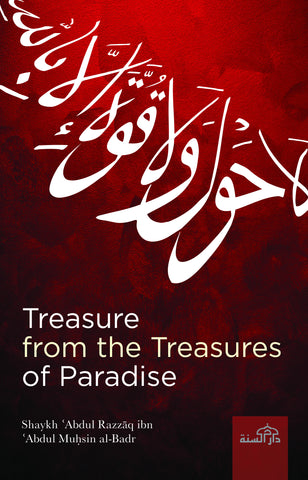
Treasure from the Treasures of Paradise by Shaykh `Abdul Razzaq ibn `Abdul Muhsin al-Badr
Allah, The Most High, Said, "The men who remember Allah often and the women who
do so - for them Allah has prepared forgiveness and a great reward." [Al-Ahzab, 35]
He also Said, "O you who have believed, remember Allah with much remembrance,
And exalt Him morning and afternoon..." [Al-Ahzab, 41]
Al-Bukhari recorded a report from Abu Musa al-Ash'ari (may Allah be pleased with him)
who narrated that the Messenger of Allah said, "The example of a person who makes
dhikr of his Lord and a person who does not, is like that of a living and a dead person."
Making dhikr (remembrance of Allah) has a lofty place in the Din of Islam and is
inherently inscribed in the souls of the believers; for it is from the greatest acts of
worship and provides enumerable fruits and benefits in this life and the next.
Dhikr is distinguished with many virtues through its perfect meanings, beautiful
phrasings and comprehensiveness that contains depth of meaning and incorporating
all types of goodness. Its wordings are concise while reflecting great reward, is easy to
remember and pronounce possessing tangible effects on the body and soul.
From such great adhkar the Prophet used to consistently make and encourage others
regarding it, is the Hawqala, or the saying of ‘La Hawla wa la Quwwata illa Billah’. This
remembrance has merits and virtues none but Allah fully encompasses - the meanings
and implications of which, lead to certainty and solace through strengthening ones’
faith and connection with Allah. This special dhikr is of such importance that the author
(may Allah preserve him) saw the need to single it out in this short treatise, entitling
it, "The Hawqala: Its meanings, virtues, and creedal implications". It is hoped Muslims
will focus their efforts in meaningfully utilising this phrase and making it a regular
feature of their every day lives, along with other types of remembrances of Allah.
